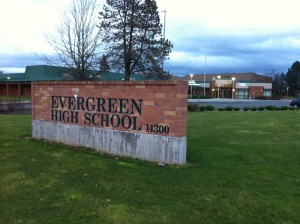Five different Clark County school districts are asking voters to approve property tax levies in a special election Feb. 14, with requests ranging from $47 million in Ridgefield to $400,000 in Green Mountain.
The Evergreen, Hockinson, Woodland, and Green Mountain school districts are looking to replace levies that are set to expire at the end of 2012. Ridgefield is seeking a new property tax request to fund $47 million in general obligation bonds that would finance major capital improvements at its four schools.
Washington is legally obligated to provide basic education for more than a million school-aged children at 2,350 public schools statewide. Individual schools receive about 70 percent of their funding from the state, with the remaining amount filled in by local, federal, and additional state-funded levy equalization funds.
Currently, most Washington school districts collect no more than 24 percent of their operating budgets from local taxpayers. This comes in the form of operation and maintenance levies which are intended to supplement state dollars by funding such things as extracurricular programs, additional bus service, and instructional and classified staff.
“It’s an extremely critical part of continuing to run and operate a school district in the manner that we’ve been able to do,” said Evergreen School District Superintendent John Deeder in a video produced by the district.
The Evergreen, Hockinson, Green Mountain, and Woodland votes are replacement levies. Much like a contract that has come up for renewal, these are not additional taxes per se, although some do represent higher tax rates.
In 2010, for example, Evergreen passed a two-year, $41.5 million levy that will expire on Dec. 31 of this year. The amount represents about 19 percent of the district’s $239.3 million budget. The district enrolls 26,956 children and spends 45,950 for basic education and $9,156 total per pupil.
According to the Clark County Assessor’s office, the effective tax rate of Evergreen’s levy is $3.82 per $1,000 assessed property value. If approved, Evergreen’s new four-year levy will start Jan. 1 of 2013, with a projected tax rate next year of $4.19 per $1,000 of assessed value, equaling $43.3 million.
From there the Evergreen tax rate increases yearly, topping out at $4.51 per $1,000 in 2016 for a total collection rate of $46.7 million.
Hockinson is seeking a four-year, $3.3 million levy to finance school programs and operations, and a second $511,000 levy to pay for the acquisition and installation of educational technology as well as other security and facility improvements.
Woodland is asking for a two-year levy worth $3.2 million in 2013 and $3.4 million in 2014, while Green Mountain – a rural district in northern Clark County that serves one K-8 school only – is seeking $400,000 each year, from 2013 to 2017, which represents 30 percent of its budget.
Bonds mean buildings
Unlike O & M levies, bonds target major capital improvements. In Ridgefield’s case, the district is seeking permission to issue $46.7 million in general obligation bonds to fund a host of improvements at its four schools, including new classrooms, athletic facilities, and safety measures.
Ridgefield voters have been historically averse to approving bond measures. In the last 39 years, only four out of 17 bond measures have passed. The last successful facility improvement bond was in 1991.
In September 2004, voters also approved a $1 million bond to purchase land for a second high school, but three subsequent bond requests, ranging from $56 to $85 million for a new high school, failed.
Ridgefield currently has the lowest tax rate in Clark County at $2.11 per $1,000.
Tax rates a moving target
As far as determining what a given school levy or bond vote would mean to property tax bills, Clark County Assessor Peter Van Nortwick said his office’s obligation is to collect the full amount of a levy, regardless of fluctuations in property values.
Van Nortwick said that property tax rates are based on the total assessed values of all property within a specific taxing district. If they all go up, then a lower tax rate is required to collect the funds for a specific levy. However, if property values drop the rate must increase to meet the budget obligation of the school levy.
“Therefore, when assessed values increase the levy rate decreases,” Van Nortwick said. “When assessed values decline the levy rate increases.”
Evergreen School District CFO Mike Merlino added that the dollar per thousand figures “are estimates since we have no idea what will actually happen to values. We look at current information that we have regarding the county and the district to make our estimates for future years.”










